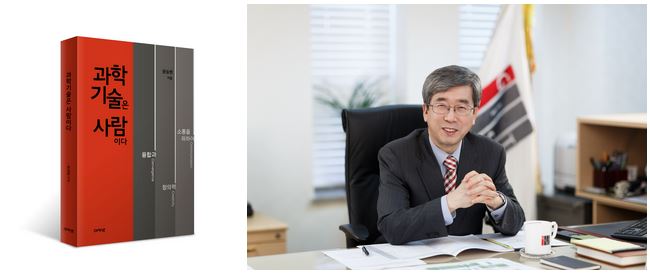Media Center
A multimedia mosaic of moments at GIST
GIST Excellence
GIST President Seung Hyeon Moon Publishes a Collection of Essays in a New Book
- 엘리스 리
- REG_DATE : 2015.10.02
- HIT : 1091
GIST President Seung Hyeon Moon Publishes
a Collection of Essays in Humans are Scientific Technology
- The book includes his experiences and philosophy garnered after working two decades in the field of the science and technology and also emphasizes his people-centric approach to science and the humanities.

□ GIST (Gwangju Institute of Science and Technology) President Seung Hyeon Moon (58) has published a collection of essays in a book entitled Humans are Scientific Technology, which includes his insights and philosophy as a scientist, educator, and administrator that he has garnered after twenty years of working in the field of science and technology.
□ The book contains President Moon"s experiences from after he became a professor of environmental science and engineering at GIST in 1994 and includes various articles that he wrote for newspapers.
∘ In the first section of the book called "Humans are Scientific Technology," President Moon shares his philosophy and views about scientific technology. He also shares policy guidelines which he believes is necessary for the continued development and advancement of Korea"s scientific technology. In the second section of the book called "Global GIST," he relates stories about his experiences in the scientific educational field and shares his thoughts on how to efficiently manage a research university. In part three of the book called "Living Together in Wisdom," President Moon includes his experiences as a researcher at the Argonne National Laboratory in the United States after receiving his doctorate.
∘ Of particular interest, the book contains President Moon"s candid thoughts about people-centric scientific technology and the importance of the humanities in education:
"We need policies focusing on scientific technology for the short-term and policies focusing on people for the long-term. While corporations and industries plan for the future based on current developments in scientific technology, colleges and universities must plan for the future by educating innovative and creative individuals who can evolve with any new advances in scientific technology" [pg. 14].
"Scientific technology that does not consider its role and impact on humanity can become a disaster for humanity" [pg. 52].
"Scientific creativity that is essential to the future prosperity of our country will only emerge after we make unconditional investments in people" [pg. 55].
□ President Moon also noted, "I have included values in the book that I want to live by after twenty years of researching and teaching students at GIST as well as values that I have gained from my time in managing the university."
He concludes by saying, "I hope this book will be beneficial for all the readers—not just for researchers and students in scientific fields—but for ordinary people as well."